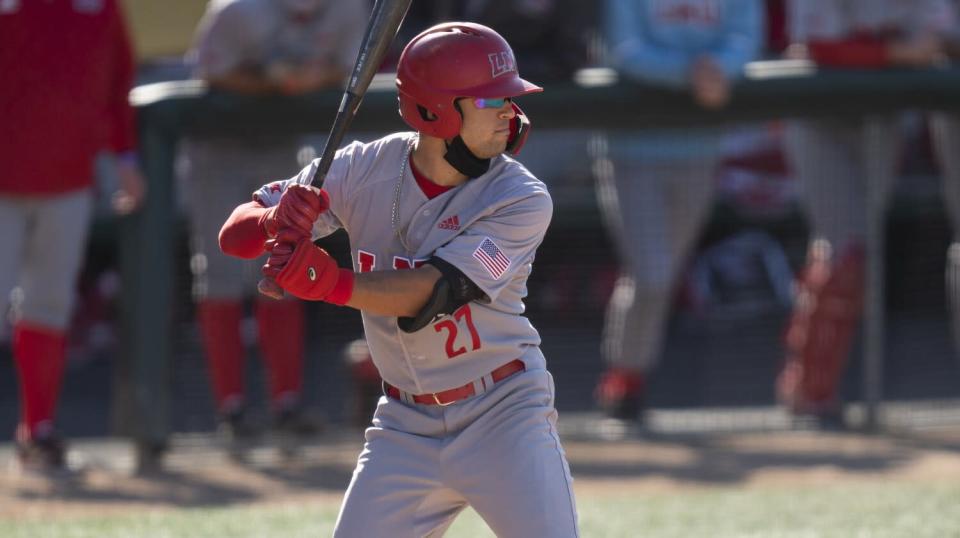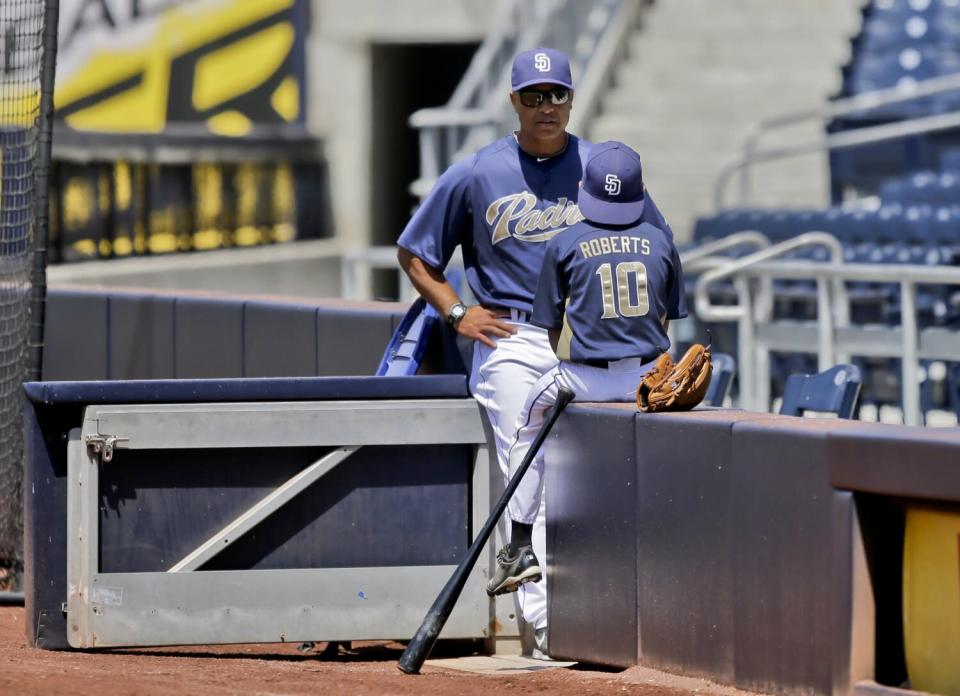
With almost every pitch, Dave Roberts’ eyes impulsively darted toward the mound.
He wasn’t in a dugout. Wasn’t in uniform. And certainly wasn’t anywhere close to his normal springtime routine.
But even here, wedged into a plastic blue seat at Loyola Marymount University’s quaint ballpark, bundled up in a thick puffy jacket on a brisk coastal night, sitting several rows back in the stands behind home plate, Roberts’ managerial instincts kicked in — a natural urge that, in the middle of Major League Baseball’s continuing lockout, gnaws at him a little more each day.
“My body is telling me and my mind is telling me I need to be in spring training right now,” he said while watching a game last week between LMU and Creighton.
After briefly pausing as another pitch zipped toward the plate, Roberts then chuckled: “I kind of find myself managing the game.”
Alas, Roberts doesn’t know the next time he’ll be leading the Dodgers again. The first seven games of the team’s regular season were canceled Tuesday. Important early weeks of spring training have already been lost. It is all unfolding ahead of what’s set to be the final year of Roberts’ current contract, too, though it’s expected that the club and 49-year-old skipper will reach an extension to lock him down long term.

Still, until there is a resolution to the work stoppage, a profession usually marked by structure and routine is being overshadowed by uncertainty for the season ahead.
So, Roberts is embracing one of the few silver linings he can. His son, Cole, just began his junior season as a starting infielder for LMU. And for one of the first times since he began his coaching career a decade ago, Roberts is getting an unimpeded experience as a full-time baseball dad.
“It’s great,” Roberts said. “Something for me I’ve tried to focus on, and I’ve mentioned it at different times, is just being present in whatever we’re doing. When I’m managing the Dodgers, that’s where I need to be present. But right now, I’m in a situation where I can’t do my job. So the best way to put one foot in front of the other is to be present and watch my son’s ballgames.”
Ever since the former big-league outfielder became the San Diego Padres’ first base coach in 2010, two years after retiring as a player, Roberts has tried to delicately balance his responsibilities at home and at work.
It was right around that time that Cole, the eldest of Roberts and wife Tricia’s two children, was old enough to begin taking sports seriously. While Roberts was careful not to thrust baseball onto his son — “I didn’t want him to feel that pressure to walk in my footsteps,” Roberts said — the sport became Cole’s passion anyway, reinforced every time he accompanied his dad to the ballpark.
“Some of my earliest memories of baseball have probably been going to the field with my dad during the summertime,” Cole said. “Just hanging around guys like Cameron Maybin, Will Venable, whoever it was, them taking time to talk to me. I mean, I was 10 years old, but they still took the time to really teach me things about baseball.”
Roberts was always Cole’s biggest influence.
When they watched games at home together, Roberts would rewind plays to highlight little things, like an infielder’s first step, a baserunner’s secondary lead or an outfielder’s read on a fly ball.
When Cole would seek out mental tips to help his game, Roberts relayed stories from his own big-league career.
And even as it became harder for Roberts to attend many of his son’s games in person — especially after he was hired as Dodgers manager in 2016, and Cole blossomed as a star prep player back in San Diego — the two would catch up almost every night over FaceTime calls, filling each other in on his team’s game and talking through the latest highlights and hurdles of their respective careers.
“We’re a big FaceTime family,” Cole said. “That’s how we stay connected.”
This year, however, father and son have enjoyed a different routine, getting literal face-to-face time at the end of almost every game.

Where in a normal year, Roberts would be lucky to see even two of Cole’s games with LMU — where the infielder enrolled in 2019 after being drafted by the Padres in the 38th round out of high school — the manager has been a familiar face on campus over the first three weeks of this season, taking in as many games as he can along with Tricia and their daughter Emme, a high school senior.
“It’s really just a blessing to look up there, see my sister, my mom and my dad,” said Cole, who has complemented strong defensive play with six hits and four RBIs through the season’s first eight games. “They’re all supporting me. It’s pretty surreal.”
It’s been a gift for Roberts, too.
In some ways, Cole’s seasons have always served as a welcome distraction from the pressures of his own job, a way for Roberts to “stay connected to my family” even in the thick of a major league schedule.
“I think if there’s anything I’ve been guilty of in my career, it’s once baseball season starts and the bell rings, my only focus is managing the Dodgers,” Roberts said. “And that’s not something I’m proud of saying, because there’s got to be some balance with family. But with [Cole] playing, keeping an eye on his games, it just allows me to take a step back and root for my son, celebrate his successes and, when it’s not going well, be there to support him.”
This season, Cole’s campaign is providing an inverse effect. Never before has Roberts been home so much at this time of the year. Baseball is the thing that he’s missing — and that, in the absence of any major league activities, Cole’s games are allowing him to stay connected to.
“It’s scratching an itch,” Roberts said. “One part of it is, you’re a dad and you’re rooting for your son. But another part of it is, I’m just a fan of the game and seeing how the game plays out and watching talent on the field.”
Before the season started, Roberts did have brief conversations with his son. Ever cautious about heaping too much stress on Cole’s shoulders, he wanted to confirm it was OK if he went to more games this year, that his increased attendance wouldn’t become an extra distraction.
Cole didn’t take long to formulate an answer.
“He said multiple times, ‘If you don’t want me to come because you don’t want the pressure, I won’t,’” Cole recalled. “But I was like, ‘Absolutely not. You have this opportunity that we might never get again. I’d always love for you to come to my games when you have the chance.’”
This story originally appeared in Los Angeles Times.
